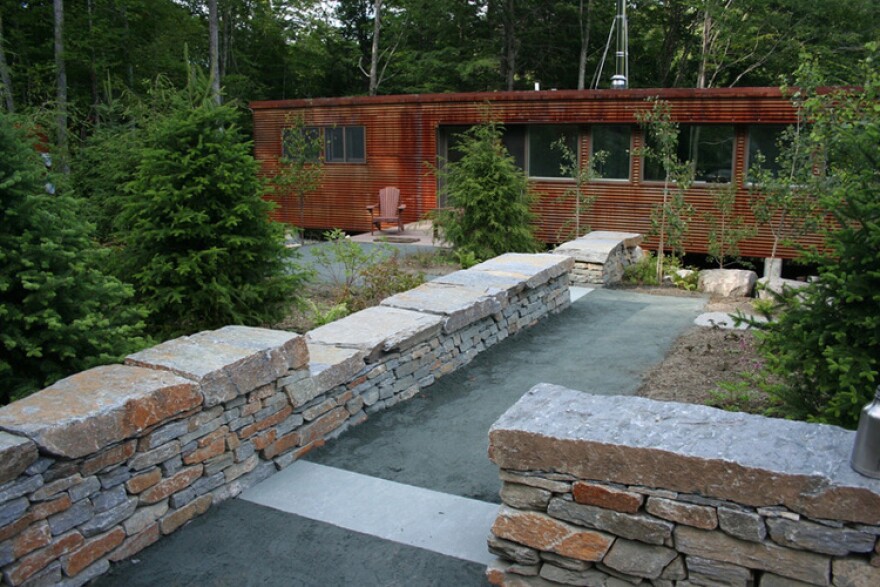The Monkton-based musician Jamie Masefield has been improvising on the jazz mandolin for decades. Like many musicians, he has a second job – and it involves some heavy lifting.
When he’s not making music, Masefield works with stone. He’s a professional dry stone mason, which means he builds walls and foundations and sculptures that support themselves, without any concrete smooshed between the cracks. Today he’s building a retaining wall near Lake Dunmore with exactly one tool: a mason hammer.
“In the industry we call this rainbow stone, and it's very nice to work with,” he says, pounding away at slabs of pinkish stone to shape, or dress, them for the wall.
“The first concern is longevity," he says. "We want to build something that lasts a long time, that has real functionality, that’s not just there to please a homeowner for 15 years.”
Another word for this is stability – which is exactly was what Masefield was looking for when he got into masonry. He’d been living on the road with his band, the Jazz Mandolin Project. Some of their stuff actually sounds like the musical equivalent of life on tour.
Masefield recalls the frenetic lifestyle: “Driving around the country, in a van, playing over 100 shows a year, sleeping in funky motels alongside the roaring highway … Tour managers, full-time employees, booking agents, publicity people.”
He was ready for a change.
“I was feeling more of a need to have a vegetable garden and eat good food and be healthy and be outside,” he says. In 2005, he contacted an old friend who ran a local landscaping company, and asked if he could pick up some part-time work.
"And the first day I went to work for him, he had me building the corner of a stone wall," Masefield says. "And I loved it."
Before long, Masefield was pursuing professional certification through the Dry Stone Walling Association of Great Britain, a nonprofit that promotes and celebrates the ancient craft in the UK and beyond.
“It draws weirdos and strange types of people,” says Andrew Louden, a master craftsman with the association and a decorated dry stone mason.
“The vast majority of people I come across who do walling as a profession have come to it as a second profession,” Louden says. “I think it’s more, perhaps, a lifestyle choice.”

When Jamie Masefield made the choice, he went all in – and he started taking timed certification tests that the association runs for professional builders.
“You’d have these master craftsmen with their clipboards marking you on the various elements of your wall that you’re building,” Masefield says.
When Masefield took the seven-hour intermediate test in 2012, Andrew Loudon was his judge.
Louden says the timed element is one of the most important parts of the certification, “because a craftsman has to prove that he’s economically viable.”
Masefield proved as much. But because he also wants to stay musically viable, when he’s on the job site he has to be compulsive about protecting his hands.
“I wear gloves all the time when I’m working,” he says. “Sometimes, like going to the bank or something, and saying ‘Yeah, this is on my business account, I’m a stone mason,' … Sometimes I walk away thinking, ‘That guy didn’t believe me. He doesn’t think I’m a stone mason.’ My hands are too soft, because I’m wearing these gloves all the time.”

"He puts himself into whatever it is he's doing pretty sincerely," says Jon Fishman, the drummer for Phish. Fishman played on the 1999 Jazz Mandolin Album Tour de Flux.
Masefield’s known Fishman and the rest of Phish since their days all together at the University of Vermont in the 1980s. ("Any stories involving Jamie Masefield are not fit for public consumption," Fishman jokes.) Masefield and Trey Anastasio both studied under the composer Ernie Stires .
Fishman says that when he started playing with Masefield , he recognized a kindred spirit.
"Jamie was one of those people. Like, 'Oh, this guy's ... pretty dedicated. This is another human who it's not just a hobby for,'" Fishman says. "And to be perfectly honest, when he started to go down the stone building route, I actually was a little jealous."
The two still play together occasionally, in an outfit called Masefield Perkins Fishman Bolles. Masefield likes to line up gigs in the winter, when the masonry jobs slow down; the group is booking shows around New England for February.

"The idea of playing the mandolin and doing stonework are – I find it very odd," Masefield says, laughing. "I don't know how all this happened."
It’s tempting to think that Masefield inhabits two totally different creative worlds. But he says jazz and masonry have something fundamental in common.
"In jazz we have a phrase called playing changes. When we're playing changes, we're soloing over those harmonic changes in that particular tune," he says. "And so you're very quickly making decisions about what you're going to play. And so, when I'm doing stonework, I often feel like we're in the midst of playing changes, because every stone you place needs some consideration. But you can't dwell on it all day long. And so you get this stream of consciousness going."
So, improvisation. But there’s a deeply personal element, too.
"Something good will affect everyone a little bit differently. And it might be in a very subtle way," Masefield says. "Someone might walk by a stone wall every day that's along the sidewalk and just slowly grow to love that wall. And they don't even know why."
Just like a song that works its way into the soundtrack of your life. The task is monumental, so to speak. Make something for the ages – make something for everyone. How many of us are trying to do that?






